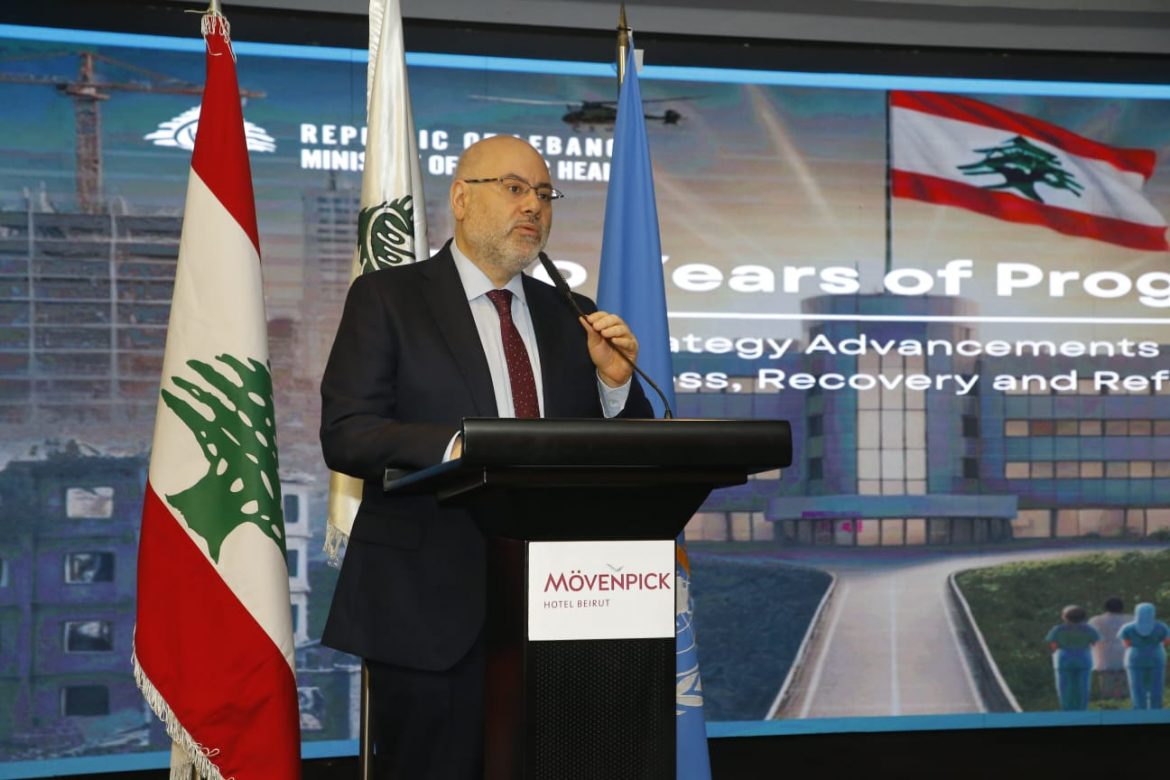Beirut, Lebanon – February 12, 2025: The Ministry of Public Health (MoPH), in collaboration with the World Health Organization (WHO) Lebanon Office, held a two-year review of Lebanon’s National Health Strategy: Vision 2030, which was launched in January 2023. The review provided an in-depth assessment of the progress made on the strategy’s objectives and identified areas where further efforts are needed to strengthen the health sector moving forward.
In his remarks, outgoing Minister of Public Health Dr. Firass Abiad noted that the review report reflects the achievements made over the past two years, highlighting the collective vision and resilience that have guided Lebanon through one of its most challenging periods. He emphasized that, in response to Lebanon’s ongoing crises, the Ministry of Public Health adopted a transformative approach, turning difficulties into opportunities to rebuild and fortify the health system.
“This approach not only ensured resilience and preparedness, but also propelled systemic improvements that addressed immediate needs while setting the stage for long-term reform,” Dr. Abiad said. He expressed his gratitude to the Ministry’s partners and stakeholders for their collective efforts in advancing Lebanon’s health sector. “As a new government takes office, we hope this review serves as both a record of progress and a roadmap for future action,” he concluded.
The event featured several panel discussions, an exhibition, and valuable exchanges of knowledge and expertise among UN agencies, donors, health sector partners, and ministry staff. Topics explored during the event included emergency response lessons, public health functions, universal health coverage, digital health, workforce development, and the role of donors and partners in supporting Vision 2030.
WHO Representative in Lebanon Dr. Abdinasir Abubakar praised the Ministry and its partners for transforming the challenges posed by the multi-layered crises into opportunities for reform and modernization. He reaffirmed WHO’s unwavering support for Lebanon’s Vision 2030, emphasizing the importance of a resilient and inclusive health system. “We stand with the Ministry of Public Health in building a health system that is inclusive, resilient, and prepared for the future – ensuring Health for All,” he said.
Much emphasis was directed at the generous contributions and support by donors mainly Luxembourg – UHC fund for sponsoring the event and other donors whose contributions have positively impacted the health system in Lebanon, including Italy, Norway, European Union, DG ECHO, CERF, Spain, Canada, Austria, CDC, PIP, Ireland, AFD, France, Germany, Republic of Korea, Japan and USAID.
Ms. Alessandra Viezzer, Head of Cooperation for the European Union Delegation to Lebanon, expressed the EU’s ongoing commitment to long-term improvements in Lebanon’s healthcare system. “As Lebanon moves into a recovery phase, its people must be at the centre of the recovery. A functioning health sector is crucial to rebuild trust of people in the state. The EU remains committed to long-term improvements in Lebanon’s healthcare system. We will continue to support key reforms that make it more sustainable, efficient, better prepared for future challenge and people centered,” she said.
The event was concluded with a word by Lebanon’s newly appointed Public Health Minister Dr. Rakan Naser El Dine, offering an opportunity for dialogue and exchange on the path forward for Lebanon’s health sector. “I want to assure you that my concept of continuity of care will continue to apply in my role as Minister of Health. Priorities, evidence-based medicine, and cooperation with various stakeholders are essential to maintaining this continuity. The strategy is not about any single individual; it is a national effort, and we will move forward with this health strategy. We will benefit from every contribution made to address and fill any existing gaps.” He concluded by thanking Dr. Abiad for his dedication and strong leadership.
- Panel 1: Lessons from Crisis – Key insights from Lebanon’s recent emergency response, governance and coordination improvements, and next steps in emergency preparedness.
- Panel 2: Strengthening Essential Public Health Functions – Evaluation of the current status and future steps to enhance public health functions.
- Panel 3: Universal Health Coverage – Addressing progress towards equity and expanding access to healthcare services for all Lebanese citizens.
- Panel 4: Digital Health and Workforce Development – The role of technology and capacity-building in driving health system reform.
- Panel 5: Donors and Partners Contribution to Vision 2030 – Ensuring that international aid supports long-term improvements in Lebanon’s healthcare system.

